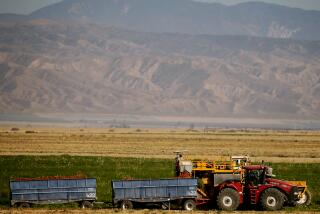Sopping County Still Paying Rainmaker to Stand By
- Share via
What’s wrong with this picture?
On a day when freeways disappeared under water, houses teetered on their foundations and rescuers kept a wary watch on swollen flood control channels, a cloud-seeding company was collecting $400 from Los Angeles County to stand by in case anyone needed rainmakers.
Indeed, even though water officials have used superlatives to describe this very wet winter, the county continues to pay its rainmaking firm thousands of dollars a month at a time when it faces a budget shortfall in the coming year that may approach $1 billion.
Some officials insist that it makes sense.
But Supervisor Gloria Molina plans to introduce a motion before the Board of Supervisors next week to suspend the county’s contract with Utah-based North American Weather Consultants for the remainder of the month.
“We find it totally ludicrous to keep paying this company $400 a day while we’re in the midst of a whole month of heavy rain,” a Molina spokesman said.
The county has an $181,460, six-month contract with North American, which includes the daily payments as well as installation and other fees. It could suspend the $400-a-day fees, with the contract resuming the following month if more rain was needed.
Mel Blevins, an engineer with the Los Angeles Department of Power and Water, said the program is unnecessary because the city agency considers the drought over, locally. “If I were the manager of that program, I would cancel the contract,” he said.
But county engineers said it makes sense to artificially produce rain this year because it is cheaper than importing water.
“It’s money well spent,” said Bob Pedigo of the county Department of Public Works.
North American, which gets paid whether it seeds or not, has made rain three times this winter. The process starts when workers discharge microscopic particles of silver iodide into the air from generators in the San Gabriel Mountains between Azusa and Pacoima.
As a result, a quarter-inch of extra rain fell, saving about $308,000 in water costs, contended Dan Lafferty, a county public works engineer. That figure is based on the fact that it costs less to artificially produce rain and then pump the water out of the ground locally than to import it, Lafferty said. The county pays about $322 per acre-foot for imported water and $90 to pump it locally, he said.
Also, the county may need some artificially produced rain to top off its reservoirs if the current rains turn out to be the last of the season’s heavy storms, Pedigo said.
Some of those reservoirs were close to capacity this week when the county released about 26,000 acre-feet of water to reduce the risk of flooding from the current storm. That is roughly enough water to supply 26,000 households for 18 months.
To replenish the reservoirs, it would be cheaper to pay North American to whip up a shower after the rainy season ends than to import the water, Pedigo said.
He said he decided this week not to suspend North American’s contract for the remainder of the month because conditions may be ideal next week for cloud seeding. Rainmaking operations are only conducted when there is no danger of flooding, he said, so the rainmakers avoid major weather fronts such as those now in the area. Instead, they look for small storms.
“It’s a crapshoot,” Pedigo said. “You try to look in your crystal ball and make a judgment call.”
But Lafferty said another reason the contract was not suspended was to preserve the relationship with North American.
“We have to work with these guys,” he said. “There’s no sense in jacking them around if it’s not going to amount to much savings.”
The county operated a seeding program on and off for 14 years in the 1960s and 1970s. But it was canceled in February, 1978, after heavy rains caused severe flooding in Big Tujunga Canyon above Sunland-Tujunga. A cloud-seeding had taken place a day before the storm--which killed 11 people and caused $43 million in damage--and dozens of lawsuits were filed against the county.
All of the suits were rejected by the courts, and the county resumed the program last season because of the drought.
More to Read
Sign up for Essential California
The most important California stories and recommendations in your inbox every morning.
You may occasionally receive promotional content from the Los Angeles Times.













